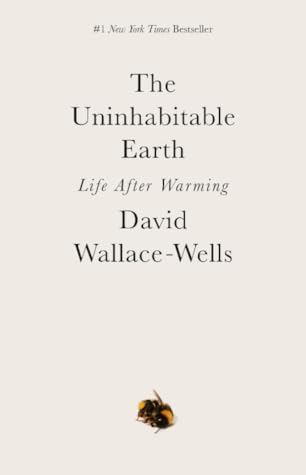More on this book
Community
Kindle Notes & Highlights
Read between
July 11 - July 20, 2020
Unless you are a teenager, you probably read in your high school textbooks that these extinctions were the result of asteroids. In fact, all but the one that killed the dinosaurs involved climate change produced by greenhouse gas.
In fact, more than half of the carbon exhaled into the atmosphere by the burning of fossil fuels has been emitted in just the past three decades.
Beginning in 2011, about one million Syrian refugees were unleashed on Europe by a civil war inflamed by climate change and drought—and in a very real sense, much of the “populist moment” the entire West is passing through now is the result of panic produced by the shock of those migrants. The likely flooding of Bangladesh threatens to create ten times as many, or more, received by a world that will be even further destabilized by climate chaos—and, one suspects, less receptive the browner those in need.
At two degrees, the ice sheets will begin their collapse, 400 million more people will suffer from water scarcity, major cities in the equatorial band of the planet will become unlivable, and even in the northern latitudes heat waves will kill thousands each summer. There would be thirty-two times as many extreme heat waves in India, and each would last five times as long, exposing ninety-three times more people. This is our best-case scenario.
At three degrees, southern Europe would be in permanent drought, and the average drought in Central America would last nineteen months longer and in the Caribbean twenty-one months longer. In northern Africa, the figure is sixty months longer—five years. The areas burned each year by wildfires would double in the Mediterranean and sextuple, or more, in the United States.
At four degrees, there would be eight million more cases of dengue fever each year in Latin America alone and close to annual global food crises. There could be 9 percent more heat-related deaths. Damages from river flooding would grow thirtyfold in Bangladesh, twentyfold in India, and as much as sixtyfold in the United Kingdom. In certain places, six climate-driven natural disasters could strike simultaneously, and, globally, damages co...
This highlight has been truncated due to consecutive passage length restrictions.
If you had to invent a threat grand enough, and global enough, to plausibly conjure into being a system of true international cooperation, climate change would be it—the threat everywhere, and overwhelming, and total. And yet now, just as the need for that kind of cooperation is paramount, indeed necessary for anything like the world we know to survive, we are only unbuilding those alliances—recoiling into nationalistic corners and retreating from collective responsibility and from each other.
the story of Atlantis, having endured and enchanted for several millennia, will compete with the real-time sagas of the Marshall Islands and Miami Beach,
the strange fantasy of Santa and his polar workshop will grow eerier still in an Arctic of ice-free summers;
As long as it has had advocates, climate change has been sold under a saltwater banner—melting Arctic, rising seas, shrinking coastlines. A freshwater crisis is more alarming, since we depend on it far more acutely.
The first country to industrialize and produce greenhouse gas on a grand scale, the United Kingdom, is expected to suffer least from climate change. The world’s slowest-developing countries, producing the least emissions, will be among those hardest hit; the climate system of the Democratic Republic of Congo, one of the world’s poorest countries, is scheduled to be especially profoundly perturbed.
Not to mention, say, our diets or our taste for Bitcoin. The cryptocurrency now produces as much CO2 each year as a million transatlantic flights.
The emergent portrait of suffering is, I hope, horrifying. It is also, entirely, elective. If we allow global warming to proceed, and to punish us with all the ferocity we have fed it, it will be because we have chosen that punishment—collectively walking down a path of suicide. If we avert it, it will be because we have chosen to walk a different path, and endure.
The climate system that gave rise to the human species, and to everything we know of as civilization, is so fragile that it has been brought to the brink of total instability by just one generation of human activity.


